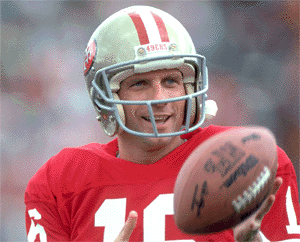The Best Ever? The story of 'Joe Cool'
2000 Enshrinee: Joe Montana
The San Francisco 49ers trailed the Dallas Cowboys 27-21 late in the fourth quarter in the 1981 NFC Championship Game. Any hope of a 49ers' win rested squarely on the shoulders of quarterback Joe Montana. Methodically, he directed the San Francisco offense 83 yards from their own 11-yard line to the Dallas six. With just 51 seconds remaining and under a fierce pass rush, the young quarterback fled the safety of the pocket and tossed a high, floating pass toward the end zone. Buried immediately under a mass of Cowboy defenders, Montana didn't see wide receiver Dwight Clark's game-winning grab, known today simply as "The Catch," but the roar of the crowd told him all he had to know. The 49ers were going to the Super Bowl.
 |
|
The charismatic smile of |
A master of late-game comebacks, Joe Montana directed his teams to 31 fourth quarter come-from-behind wins during his illustrious career with the 49ers and the Kansas City Chiefs. His uncanny ability to bring a team back from apparent defeat was so common that it simply became referred to as "Montana Magic," a magic he performed for 15 remarkable seasons.
Born in New Eagle, Pennsylvania, Montana grew up in Monongahela, a coal-mining town about 25 miles south of Pittsburgh. He attended Ringgold High School, where he played football, baseball, and basketball. Although he didn't start at quarterback until his junior year, it was his brilliant play in a 34-34 tie against arch-rival Monessen High School that attracted the attention of Notre Dame recruiters who eventually offered the young quarterback an athletic scholarship.
Although his career statistics at Notre Dame aren't overwhelming, Montana's gutsy play is legendary. He got his first start at Notre Dame as a sophomore when the team's starting quarterback was felled by injury. Coach Dan Devine later said he wasn't sure what motivated him to give the starting nod to Montana. "He just impressed me as the kind of guy who you think is going to get the job done," he said. And "get the job done" he did. Twice that season he came off the bench to pull out games in the fourth quarter.
A separated shoulder kept him out the entire 1976 season, and when he returned in 1977, he found himself listed third on the quarterback depth chart. Although disappointed, he never lost faith or confidence in his ability. Finally, in week three of the season, he was inserted into the lineup. Down 24-14 to Purdue, with 11 minutes to go, the "Comeback Kid" threw for 154 yards and a touchdown, and the Irish won 31-24.
The following season, there were more heroics as Montana pulled his team from the depths of defeat to last minute victories over Pittsburgh and USC. The Irish went on to capture a national championship.
Class of 2003 Photos
Passion Play: Lott's road to HOF
Ronnie Lott, the 49ers No. 1 pick in 1981, went on to intercept 63 passes in his career.

